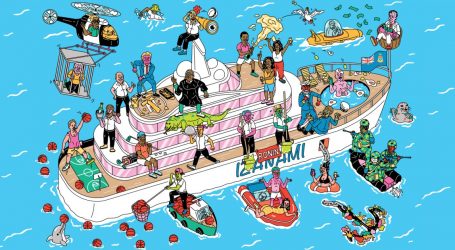From Our Archives, When the Left Was Worried It Lost (Again)
Let our journalists help you make sense of the noise: Subscribe to the Mother Jones Daily newsletter and get a recap of news that matters.Each Friday, we bring you a look at our archives to propel you into the weekend.
The historian Eric Hobsbawm’s last section of his final book in a series tracing the history of the world over the past few centuries is titled “The Landslide.” It begins in the early 1970s. He published the book in 1994. For the left—and Hobsbawm was a leftist, a committed one; his critics would lambast his staying aligned with communists even after the terrors of Stalin’s reign were revealed—the 1990s seem to have been frustrating times.
Looking back, what happened? Did the left lose? This is the era in which some decided there was an end to history. (That’s off now, by the way.) Bill Clinton was coming to power in the United States as an austerity-minded Democrat; Tony Blair was on the rise in the United Kingdom (Hobsbawm warned that Blair was “Thatcherism in trousers.”) And, of course, the Berlin Wall had fallen.
There’s an excellent new documentary about Hobsbawm on the YouTube channel of the London Review of Books. You don’t need to really know anything about him, or his work, to enjoy it. (I’m sitting here with a massive reading list, unsure exactly how this keeps happening—some great thinker of some age unknown to me.) It traces something we hear passingly as the rise of neoliberalism. (And please forgive me my sins, dear Lord; you do not have to email me about how exactly you define neoliberalism—I just admitted I learned about Hobsbawm this week; I’m working on it.)
Hobsbawm’s trajectory neatly traces the narrative I’ve seen in Mother Jones’ archives. In the 1990s, there is a crisis, and it is pegged as having started sometime in the 1970s. In 1996 we published a short piece titled “What’s Left?” Here’s what we asked Noam Chomsky and a few others:
What happened to the movement that integrated America, stopped the costly war in Vietnam, and opened workplace doors for women? Several commentators offer opinions on where the left went wrong and where it should go.
It’s an interesting phrasing of the question. Hobsbawm seems to note that this is a world phenomenon, a global wreckage of the post-USSR order. We phrase it more as a moral failing in the United States. There is also an idea that what happened here was not the forces of history driving austerity politics and toppling a “golden age” after the war (Hobsbawm’s description of it). Instead, it is us. We, the left, have failed. We “went wrong.”
Three of the four people we asked in 1996 answered something akin to: Identity (or grievance) politics is splitting up the left. The other answer says the left kept taking in false moderates and centrists. (Hobsbawm was not a lover of identity politics. It had whiffs of a nationalism he disliked and feared from his experience living in Berlin as Hitler rose to power.)
I’d be curious if this “What’s left?” question would be answered differently today. Or if the question would be phrased in this way—as in what we did wrong. Some would still lambast identity politics (I disagree); others would hate the left’s flirtations with centrist austerity (I find this appealing). The most provocative thing may be the degree to which, ironically, leftists rarely focus on the larger structure of this debate. The grand forces of history are cast aside. Isn’t that what we did?
We Recommend
Latest





